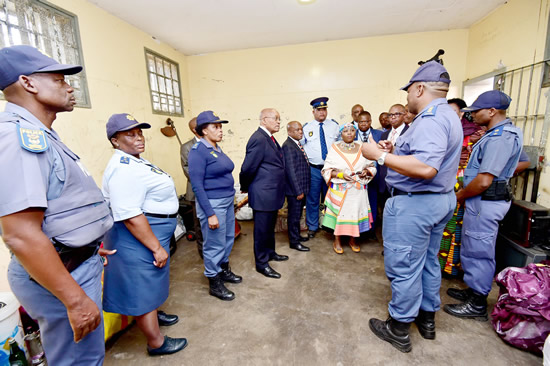KwaZulu-Natal’s uMkhanyakude District is a beautiful and remote corner of our country where South Africans, Mozambicans and Swati people live and work side by side in agriculture, mining, manufacturing and services in places such as Sikhamelele, Manguzi and Mbazwana.
 Sadly, large numbers of South Africans and foreign visitors often speed past or around these areas close to our border with Mozambique en route to enjoying the adventure and tranquility on offer in nearby world-class tourism attractions.
Sadly, large numbers of South Africans and foreign visitors often speed past or around these areas close to our border with Mozambique en route to enjoying the adventure and tranquility on offer in nearby world-class tourism attractions.
Indeed, many visitors entering this region do so with deep concern for, or anticipation of, the natural assets in the area, including forests, wildlife, waterways and the coastline along Kosi Bay.
Few pause to ponder the living conditions of the close to 40 000 households in the area, where 54 per cent of households are headed by women and where 41 per cent of the population are children under the age of 15.
On 27 April 2017 government focused the nation’s gaze on Manguzi (formerly Kosi Bay town) by hosting our national celebration of Freedom Day in Manguzi.We dedicated our 23rd Freedom Day to our great patriot, Oliver Reginald Tambo, under the theme “The Year of Oliver Reginald Tambo, Together Deepening Democracy and Building Safer and Crime-Free communities”.
We want to see an end to vicious attacks on women and children, the house break-ins, cash-in-transit heists, car hijackings, stock theft and other crimes that make life difficult for our people in many communities.
Government chose Manguzi as the stage for our national day after I paid a Presidential Siyahlola Monitoring visit to the area, specifically because of the aggressive cross-border crime which has included car hijackings and theft, with vehicles being taken to Mozambique across the border.
In the imbizo with the community, residents outlined various challenges they faced and I assigned several departments to work on the issues that had been raised by the community, as part of the freedom citizens enjoy to talk directly with government.
When I visited Manguzi police station I found it dilapidated, with inadequate personnel and resources to handle the matters at hand. I found the same situation in Nyanga in Cape Town in February and also in Soshanguve in Gauteng which means we need to improve capacity in police stations serving black communities.
As a government that cares, listens and acts, we have set aside R92 million for the renovations of the Manguzi police station. Already, painting and other minor refurbishments are being undertaken so that the police can work in a more conducive environment.
The KwaZulu-Natal provincial government has supplied the police station with vehicles to enable faster responses when crimes are being committed.
The police station has also been upgraded to a level of a Colonel and measures have begun to fill 44 vacant posts.
The South African National Defence Force and SAPS on the border have begun to work together on efforts to defeat cross-border crime, as it was clear that there was little collaboration and criminals were taking advantage of a lack of coordination.
The SANDF has increased the deployments along the border with Mozambique here and the law enforcement agencies will continue to do their best to prevent the cross-border car thefts with the support of the community.
Without the support of the residents, though, very little progress will be made, and so government invites the Manguzi community – like we invite all South Africans – to work closely with our law-enforcement agencies.
The progress we are seeing in making Manguzi and surrounding areas safer and to avoid tensions between South Africans and Mozambican nationals shows that in South Africa, there are no “forgotten corners” or places where we aren’t improving living conditions daily.
Rural development and safer communities are among the key priorities pursued by government under our National Development Plan. It has been our mission since the dawn of democracy 23 years ago that the footprint of development must be seen and felt in all parts of our country.
Manguzi – and many places like it in all nine provinces – has become and will remain a part of this development footprint, as government works with communities and civil society to move South Africa forward.
It is development of this kind that gives true meaning to the freedom we attained 23 years ago.




 Facebook
Facebook Twitter
Twitter WhatsApp
WhatsApp